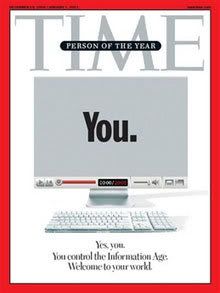Time Magazine,"You" & English Grammar

Personally, I am confused by Time Magazine's Man of the Year award for 2006.
The cover of Time shows a mirrored image of a computer with the word "You." in the center where the viewer's reflection will supposedly be.
My confusion is as to whether the noun "You" is plural or singular.
If it is plural then everybody who can squeeze their reflection into the picture can be, collectively, "People of the Year."
If, however, it is singular, then only one person is allowed to be reflected at a time, leaving each eligible person free to declare themselves to be the "Person of the Year."
There is a big difference between an impersonal plural that includes everybody taken together (but does not allow for any one individual to be identified as unique or special) or a personal singular that qualifies each individual to be a potential one-of-a-kind "Person of the Year."
In philosophy and religion this distinction is often used to contrast Eastern collectivity and Western individualism.
Buddhism, for example, has a corner on the market for its love and compassion for "humanity" whereas Christianity is noted for its insistence that each individual "human" is of infinite worth and value.
A plural "You" would also fit in well with the Marxist/Socialist concept of the "masses" and the "proletariat." It is the collective survival of this group that is the determinative value as opposed to the value of any one member of that group. In this world view individuals are expendable. As Stalin reputedly said, "If you are going to make an omelet you will need to break some eggs."
A singular "You" would more appropriately reflect the American mystique of the "rugged individualist." Here we would find the Jimmy Stewart Goes to Washington ideal where one person/one vote can make all the difference in the world; anyone can grow up to be President and, if you work hard enough, you can become a millionaire!
To be honest, based on my reading of old, tattered copies of Time Magazine in doctor's offices, I am doubtful that such a subtle distinction of grammar held very much interest for the editors of that september publication.
It seems far more likely that they simply "copped out" and decided that, like the Democratic Party, they would refuse to be held accountable for having any particular position on any particular subject.
This strategy seemed to work well in the last elections.
As for Time, their singularly pluralistic waffling on the word "You" seems spectacularly underwhelming.


<< Home